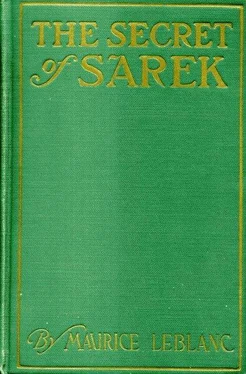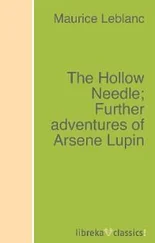Maurice Leblanc - The Secret of Sarek
Здесь есть возможность читать онлайн «Maurice Leblanc - The Secret of Sarek» весь текст электронной книги совершенно бесплатно (целиком полную версию без сокращений). В некоторых случаях можно слушать аудио, скачать через торрент в формате fb2 и присутствует краткое содержание. Жанр: Классический детектив, на английском языке. Описание произведения, (предисловие) а так же отзывы посетителей доступны на портале библиотеки ЛибКат.
- Название:The Secret of Sarek
- Автор:
- Жанр:
- Год:неизвестен
- ISBN:нет данных
- Рейтинг книги:4 / 5. Голосов: 1
-
Избранное:Добавить в избранное
- Отзывы:
-
Ваша оценка:
- 80
- 1
- 2
- 3
- 4
- 5
The Secret of Sarek: краткое содержание, описание и аннотация
Предлагаем к чтению аннотацию, описание, краткое содержание или предисловие (зависит от того, что написал сам автор книги «The Secret of Sarek»). Если вы не нашли необходимую информацию о книге — напишите в комментариях, мы постараемся отыскать её.
The Secret of Sarek — читать онлайн бесплатно полную книгу (весь текст) целиком
Ниже представлен текст книги, разбитый по страницам. Система сохранения места последней прочитанной страницы, позволяет с удобством читать онлайн бесплатно книгу «The Secret of Sarek», без необходимости каждый раз заново искать на чём Вы остановились. Поставьте закладку, и сможете в любой момент перейти на страницу, на которой закончили чтение.
Интервал:
Закладка:
"He was an odd person, this Maguennoc, a belated descendant of the sorcerers of old; and I strongly suspect him of playing the ghost on more than one occasion. You may be sure that the white-[Pg 317]robed, white-bearded Druid whom people declared that they had seen on the sixth day of the moon, gathering the mistletoe, was none other than Maguennoc. He too knew all about the good old recipes, the healing herbs, the way to work up the soil so as to make it yield enormous flowers. One thing is certain, that he explored the mortuary crypts and the hall of the sacrifices, that it was he who purloined the magic stone contained in the knob of the sceptre and that he used to enter these crypts by the opening through which we have just come, in the middle of the Postern path, of which he was obliged each time to replace the screen of stones and pebbles. It was he also who gave M. d'Hergemont the page from the missal. Whether he confided the result of his last explorations to him and how much exactly M. d'Hergemont knew does not matter now. Another figure looms into sight, one who is henceforth the embodiment of the whole affair and claims all our attention, an emissary dispatched by fate to solve the riddle of the centuries, to carry out the orders of the mysterious powers and to pocket the God-Stone. I am speaking of Vorski."
Don Luis swallowed his third glass of water and, beckoning to the accomplice, said:
"Otto, you had better give him a drink, if he's thirsty. Are you thirsty, Vorski?"
Vorski on his tree seemed exhausted, incapable of further effort or resistance. Stephane and Patrice once more intervened on his behalf, fearing an immediate consummation.
"Not at all, not at all!" cried Don Luis. "He's all right and he'll hold out until I've finished my[Pg 318] speech, if it were only because he wants to know. You're tremendously interested, aren't you, Vorski?"
"Robber! Murderer!" spluttered the wretched man.
"Splendid! So you still refuse to tell us where Francois is hidden?"
"Murderer! Highwayman!"
"Then stay where you are, old chap. As you please. There's nothing better for the health than a little suffering. Besides, you have caused so much suffering to others, you dirty scum!"
Don Luis uttered these words harshly and in accents of anger which one would hardly have expected from a man who had already beheld so many crimes and battled with so many criminals. But then this last one was out of all proportion.
Don Luis continued:
"About thirty-five years ago, a very beautiful woman, who came from Bohemia but who was of Hungarian descent, visited the watering-places that swarm around the Bavarian lakes and soon achieved a great reputation as a fortune-teller palmist, seer and medium. She attracted the attention of King Louis II, Wagner's friend, the man who built Bayreuth, the crowned mad-man famed for his extravagant fancies. The intimacy between the king and the clairvoyant lasted for some years. It was a violent, restless intimacy, interrupted by the frequent whims of the king; and it ended tragically on the mysterious evening when Louis of Bavaria threw himself out of his boat into the Starnbergersee. Was it really, as the official version stated, suicide following on a fit of madness? Or was it a[Pg 319] case of murder, as some have held? Why suicide? Why murder? These are questions that have never been answered. But one fact remains: the Bohemian woman was in the boat with Louis II and next day was escorted to the frontier and expelled from the country after her money and jewellery had been taken from her.
"She brought back with her from this adventure a young monster, four years old, Alex Vorski by name, which young monster lived with his mother near the village of Joachimsthal in Bohemia. Here, in course of time, she instructed him in all the practices of hypnotic suggestion, extralucidity and trickery. Endowed with a character of unexampled violence but a very weak intellect, a prey to hallucinations and nightmares, believing in spells, in predictions, in dreams, in occult powers, he took legends for history and falsehoods for reality. One of the numerous legends of the mountains in particular had impressed his imagination: it was the one that describes the fabulous power of a stone which, in the dim recesses of the past, was carried away by evil genii and which was one day to be brought back by the son of a king. The peasants still show the cavity left by the stone in the side of a hill.
"'The king's son is yourself,' his mother used to say. 'And, if you find the missing stone, you will escape the dagger that threatens you and will yourself become a king.' "This ridiculous prophecy and another, no less fantastic, in which the Bohemian woman announced that her son's wife would perish on the cross and that he himself would die by the hand of a friend, were among those which exercised the most direct[Pg 320] influence on Vorski when the fateful hour struck. And I will go straight on to this fateful hour, without saying any more of what our conversations of yesterday and last night revealed to the three of us or of what we have been able to reconstruct. There is no reason to repeat in full the story which you, Stephane, told Veronique d'Hergemont in your cell. There is no need to inform you, Patrice, you, Vorski, or you, All's Well, of events with which you are familiar, such as your marriage, Vorski, or rather your two marriages, first with Elfride and next with Veronique d'Hergemont, the kidnapping of Francois by his grandfather, the disappearance of Veronique, the searches which you set on foot to find her, your conduct at the outbreak of the war and your life in the internment-camps. These are mere trifles besides the events which are on the point of taking place. We have cleared up the history of the God-Stone. It is the modern adventure, which you, Vorski, have woven around the God-Stone, that we are now about to unravel.
"In the beginning it appears like this: Vorski is imprisoned in an internment-camp near Pontivy in Brittany. He no longer calls himself Vorski, but Lauterbach. Fifteen months before, after a first escape and at the moment when the court martial was about to sentence him to death as a spy, he escaped again, spent some time in the Forest of Fontainebleau, there found one of his former servants, a man called Lauterbach, a German like himself and like himself an escaped prisoner, killed him, dressed the body in his clothes and made the face up in such a way as to give him the appearance of his murderer, Vorski. The military police were[Pg 321] taken in and had the sham Vorski buried at Fontainebleau. As for the real Vorski, he had the bad luck to be arrested once more, under his new name of Lauterbach, and to be interned in the camp at Pontivy.
"So much for Vorski. On the other hand, Elfride, his first wife, the formidable accomplice in all his crimes and herself a German-I have some particulars about her and their past life in common which are of no importance and need not be mentioned here-Elfride, I was saying, his accomplice, was hidden with their son Raynold in the cells of Sarek. He had left her there to spy on M. d'Hergemont and through him to ascertain Veronique d'Hergemont's whereabouts. The reasons which prompted the wretched woman's actions I do not know. It may have been blind devotion, fear of Vorski, an instinctive love of evil-doing, hatred of the rival who supplanted her. It doesn't matter. She has suffered the most terrible punishment. Let us speak only of the part she played, without seeking to understand how she had the courage to live for three years underground, never going out except at night, stealing food for herself and her son and patiently awaiting the day when she could serve and save her lord and master.
"I am also ignorant of the series of events that enabled her to take action, nor do I know how Vorski and Elfride managed to communicate. But what I know most positively is that Vorski's escape was long and carefully prepared by his first wife. Every detail arranged. Every precaution was taken. On the fourteenth of September of last year, Vorski escaped, taking with him the two ac[Pg 322]complices with whom he had made friends during his captivity and whom he had, so to speak, enrolled: the Otto and Conrad whom you know of.
Читать дальшеИнтервал:
Закладка:
Похожие книги на «The Secret of Sarek»
Представляем Вашему вниманию похожие книги на «The Secret of Sarek» списком для выбора. Мы отобрали схожую по названию и смыслу литературу в надежде предоставить читателям больше вариантов отыскать новые, интересные, ещё непрочитанные произведения.
Обсуждение, отзывы о книге «The Secret of Sarek» и просто собственные мнения читателей. Оставьте ваши комментарии, напишите, что Вы думаете о произведении, его смысле или главных героях. Укажите что конкретно понравилось, а что нет, и почему Вы так считаете.












